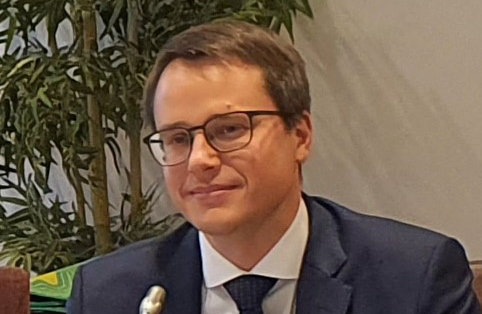
Interview with Kamil Valica, Chair of European Commission’s task force for Youth Guarantee in Western Balkans
The Youth Guarantee launch in the Western Balkans follows the milestone endorsement of the ‘Western Balkans Declaration on ensuring sustainable labour market integration of young people’ at the Brdo EU-Western Balkans Ministerial meeting on employment and social affairs in July 2021.
The Youth Guarantee ensures that all young people under 25 years of age get a good-quality, concrete offer within four months of leaving formal education or becoming unemployed. The offer should be for a job, apprenticeship, traineeship, or continued education and be adapted to each individual's need and situation.
The Youth Guarantee is Flagship number 10 of the EU’s Economic and Investment Plan for the region. The European Commission set up an EU-ILO Technical Assistance Facility with two main partners, the ETF and the ILO. The ETF provides advice and guidance on major components, such as skills development implications of transition from school to work. The ETF is also engaged in the progress monitoring.

ETF: Kamil, tell us how you got involved working on the Youth Guarantee in the Western Balkans?
KV: I have been working in the international unit of DG Employment for over four years and have been leading the enlargement team for two years and a half. When the COVID-19 pandemic hit us, we immediately understood it could have a very negative impact on young people in the EU and in the Western Balkans. I remembered the effects of the 2008/9 financial crisis and the sharp increase in youth unemployment. I myself finished my Masters, was looking for a job in that period and saw the difficulties my peers were experiencing. However, compared to 2008/9, we were in a better position, with an EU-wide experience with the Youth Guarantee scheme that had been implemented in EU member States since 2013/14 to help the sustainable integration of young people in the labour market. In autumn 2020, the Youth Guarantee in the EU was actually reinforced through a new Council Recommendation. And we thought beyond the EU of our Western Balkans partners. That is why the European Commission proposed a Youth Guarantee flagship in the Economic and Investment Plan for the Western Balkans. I was happy to be at the birth of this initiative. We then did a lot of work to raise awareness of our partners in the Western Balkans on what Youth Guarantee is. This culminated in the declaration that was endorsed by Ministers and Representatives of Western Balkans in Brdo, in which they committed to establish, implement and enhance Youth Guarantee schemes. At the European Commission, we understood the need to assist our partners from the Western Balkans. That is why we set up a technical assistance facility together with our colleagues from the ILO and the ETF. And we have accompanied the Western Balkans on the way towards drafting their Youth Guarantee Implementation Plans.
ETF: What for you are the key features of the Youth Guarantee?
The Youth Guarantee is a holistic approach to help young people sustainably integrate into the labour market. It encompasses education and early school leaving prevention and gives chances to those facing difficulties through labour market experience or going back to education.
ETF: In your experience, what are the main challenges for the Youth Guarantee?
KV: I think one big challenge is the trust of young people in public institutions and in their ability to help. For example in the Western Balkans, there are a large number of people who are in the situation of not being in employment, education or training (NEET), but they are not registered at the public employment service. It can even be as low as 10% of young people in this category who are registered. There can be many reasons such as family responsibilities, discouragement, health issues, etc., but public institutions still need to demonstrate that they are able to cater for different needs. And for this, their capacity needs to be reinforced.
Some Western Balkans partners, for example, don't have or have only limited second chance education possibilities for young people. For example, in Albania you can study in vocational school only until the age of 21. So, what are young people able to do after this? How can they obtain a qualification if they are older? As part of the work on establishing Youth Guarantee schemes, our Western Balkans partners are mapping such issues and exploring solutions for these gaps and limitations in the system which I believe will soon lead to some regulatory changes and improvements.
ETF: We know that in the Western Balkans, the share of NEETs (those not in education, employment or training) rises with the level of education that they have, is this something the Youth Guarantee will address?
KV: This is a striking figure and the answer is ‘yes’. The pattern of university graduates being most in danger of becoming NEETs cannot be generalized across the region. We know for example that in Albania, secondary education graduates are most likely to become NEETS, and for Kosovo, it is university graduates. We advocate that countries improve their mapping of the skills needs in the labour market, and use this information not only to plan their active labour market policies and their training offer, but also to feed it back into the education system so that it becomes more aligned with labour market needs. We are also advocating for more participation of employers in the provision of vocational education and training. The mismatch that we see can be also linked to the fact that the number of university graduates has really increased very fast over the last years and companies are not able to absorb all the workforce. However, this relates to the demand side of the labour market and with the Youth Guarantee we are working more on the supply side, the human capital part of the equation.
ETF: What are the steps being taken to get young people involved in the Youth Guarantee and, as you mentioned, to register with public employment services and get started on their first traineeship or job?
KV: To attract young people to register, it is important that public employment services in Western Balkans develop capacities to cater for the needs of all young people. If we talk about university graduates, they can be easy targets. They definitely have a level of preparation in technical fields or in humanities or social sciences that can be a basis for finding a job and probably also have very good soft skills, which are now being particularly praised by employers. And maybe these young people don't need intense support but only some assistance to learn to look for a job, how to prepare their CV and how to effectively undergo an interview. Job matching can be a very effective tool for them which is a point that was raised at the recent Youth Guarantee coordinators meeting in June 2022 in Tirana. In the European Union, about 45% of the offers in the Youth Guarantee actually come through job matching. Focusing on university graduates can bring better figures and results but this is not the overriding focus of the Youth Guarantee. The aim is to cater to the needs of all young people right across the economic and social spectrum and to give increased support to those who are most in need and ensure they have tailored offers.
ETF: Are there any key takeaways from the meeting of the Youth Guarantee Coordinators in Tirana that you would like to share?
KV: I think the first highlight was that we need physical meetings. Our Western Balkan colleagues appreciated the physical presence and the meeting was an icebreaker. We saw a lot of informal meetings and contacts exchanged, pertinent questions being asked and valuable contributions being shared. What really stays in my mind, is the progress that has been made in the Western Balkans since last autumn and the resolve with which they are now developing the Youth Guarantee implementation plans. We have already received a draft plan for review.
ETF: How valuable do you find Youth Councils? We see young people are present at meetings but how much are we actually involving them?
KV: We have witnessed a lot of energy coming from young people. They have been involved in all the multi-stakeholder groups that are working on elaborating the implementation plans. During a recent meeting in Brussels, youth organisations from the Western Balkans shared with us that currently they contributed to the development of the plans in addition to their regular work and financed this engagement from their own resources. For the future, they said that would they need capacity building and financial support to contribute to the implementation of Youth Guarantee through outreach within communities, training or other specialised offers.
ETF: Why is the case of North Macedonia frequently referred to when talking about the Youth Guarantee in the Western Balkans?
KV: North Macedonia is a pioneer in the region. They piloted in 2018 and in 2019, they started implementing the Youth Guarantee countrywide. They have been good at involving many stakeholders and they have openly shared all their experience and insights with other countries at the meeting in Tirana. They are inspirational. They have also done well in adopting the monitoring processes that are being done at the EU level. Of course, there are also some things that need to be improved such as evaluation, which needs to be planned for from the outset, and they are now working on this as part of the second National Youth Guarantee implementation plan.
ETF: How else is good practice sharing supported?
KV: I think it is important to explain that all our work with the Western Balkans is based on lessons learnt and good practice that EU Member States have made since 2013. We bring this experience from the EU to the regional meetings with our Western Balkan partners. We also encourage them to ask for support from the EU TAIEX instrument to organise study visits and exchanges to learn from the experience of EU countries.
ETF: For you, what are the next steps professionally?
KV: After many satisfying years working in this field, I will move to a new position representing the European Union at the United Nations in Geneva liaising in particular with the International Labour Organisation and the International Organisation for Migration. My work on the Youth Guarantee in the Western Balkans will always remain very dear to my heart. I believe that together with my team we made a valuable contribution to the initiative and that with the resolve of the Western Balkan partners it will progress further and soon materialize.